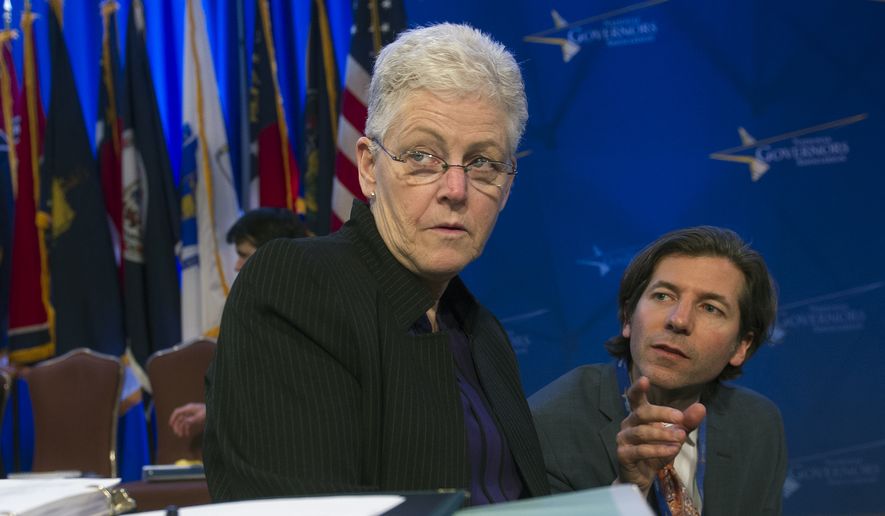Sensing a cover-up, the House Committee on Science, Space, and Technology issued a subpoena Wednesday demanding the EPA chief turn over her cellphone records and emails so investigators can try to figure out if she hid or deleted text messages in what one critic called a “cyberbonfire.”
Committee Chairman Lamar Smith issued the subpoena after saying the Environmental Protection Agency hasn’t been forthcoming with his investigation.
Mr. Smith, in a letter to EPA Administration Gina McCarthy, indicated disbelief that of more than 5,000 text messages Ms. McCarthy apparently sent, only one was deemed to have been business-related — and that came just days after the committee had alerted the EPA it may be breaking the rules.
“I am left with no alternative but to issue a subpoena to compel you to produce, among other things, unredacted cellular phone billing records and emails relevant to the committee’s oversight,” Mr. Smith said.
The subpoena comes as Congress is probing Obama administration records-keeping problems elsewhere, including former Secretary of State Hillary Rodham Clinton, who used a nongovernment-issued email server and account to conduct her official business. The State Department has acknowledged that practice has tainted its open records searches, and the administration is now scrambling to deal with the legal headache Mrs. Clinton left.
In the case of the EPA, the agency has said it is trying to produce cell records, but has said the process is taking a while because staffers are blacking out phone numbers associated with Ms. McCarthy’s “friends.” That troubled Mr. Smith, who said those friends could also be the very folks Ms. McCarthy was talking business with, citing her close relations with environmental group leaders.
Indeed, the one text message the EPA said Ms. McCarthy has received that related to business was from Gene Karpinski, president of the League of Conservation Voters, who praised her on Feb. 5 for fighting against the Keystone XL pipeline.
Ms. McCarthy replied back to that text by email, telling Mr. Karpinski: “I do not use text messaging for work purposes.”
The exchange came just days after the Science Committee informed the EPA it was looking into Ms. McCarthy’s text practices, and, in his letter, Mr. Smith pointed out Ms. McCarthy and Mr. Karpinski seemed to have a long relationship, which was incongruous with the nature of her reply to his Feb. 5 text.
Last year the EPA officially informed the National Archives, charged with overseeing federal records, that the deletion of thousands of Ms. McCarthy’s emails may have resulted in official records being lost. The Archives is supposed to be notified any time an agency realizes records may have been destroyed.
The EPA insisted the notification was a matter of caution, and it didn’t believe records were lost. The agency argues that text messages don’t usually qualify as records because they are transitory in nature.
EPA spokeswoman Liz Purchia told The Washington Times her agency will work to get the committee the documents it is seeking.
“EPA is committed to both the letter and the spirit of the law when it comes to records management and transparency,” she said.
Chris Horner, a researcher who first tried to pry the text messages loose from the agency in an open records request, said he and the Competitive Enterprise Institute are currently battling in court to stop “EPA’s cyberbonfire.”
Mr. Horner also doubted EPA’s claim that Ms. McCarthy didn’t regularly use text messages for business. He said data EPA has already provided show she “often” exchanged texts with senior aides on their EPA-assigned phones.
He said EPA officials appear to have turned to text messages to try to avoid the scrutiny that emails and other traditional communications receive from the public and Congress. But Mr. Horner said federal law is clear and considers text messages the same as emails for the purposes of records retention.
Both written and electronic federal agency records are required to be preserved, similar to emails, but not every communication is deemed to be a record. As more communications are done online, states and federal agencies are increasingly grappling with those questions.
A Washington Times sample survey of federal agencies earlier this year found that most don’t have a policy governing whether employees should be preserving and storing those kinds of electronic communications.
Mr. Smith has scheduled a hearing for Thursday on records-retention policies, and has invited officials from the National Archives to attend. Mrs. Clinton’s records could be raised as an issue at the hearing.
• Stephen Dinan can be reached at sdinan@washingtontimes.com.




Please read our comment policy before commenting.